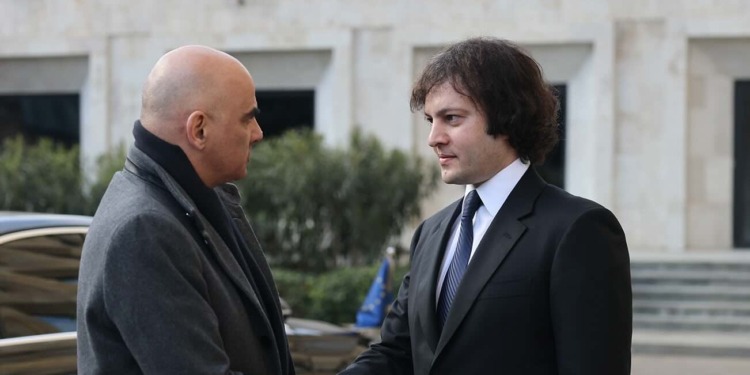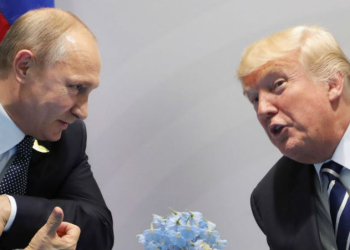The Secretary General of the Council of Europe, Alain Berset, accompanied by the Director General for Human Rights and the Rule of Law, and the Director General for Democracy and Human Dignity met Georgian Oligarch Bidzina Ivanishvili during official visit to Tbilisi. This mission takes place in a political and social context marked by strong tensions, extreme polarisation of the political debate and acts of violence in recent weeks. The aim of the visit is to ensure the conditions for continued co-operation between the Council of Europe and Georgia, in full compliance with the Organisation’s values and principles.
First thing this morning, met civil society, then @PM_Kobakhidze and @shpapuashvili. Now looking forward to exchanges with @Ombudsman_Geo, Bidzina Ivanichvili & reps of the international community. Tomorrow all day meetings with the opposition and civil society. pic.twitter.com/FY9Lp1pTfB
— Alain Berset (@alain_berset) December 18, 2024
As a member state of the Council of Europe since 1999, Georgia is bound to respect its fundamental commitments: democracy, the protection of human rights and the rule of law. These principles, enshrined in the Statute of the Council of Europe and underpinning the European Convention on Human Rights (ECHR), are essential to stability and peace in Europe. The Secretary General had the opportunity to reiterate this message with all due clarity during recent telephone exchanges with the Georgian President and Prime Minister.
In the current tense and worrying context, the Council of Europe calls on all parties to avoid any escalation of tensions. It urges the authorities to refrain from the disproportionate use of force and to respect fundamental freedoms, in particular freedom of expression and assembly. These principles are essential to guarantee the country’s stability and to meet the expectations of the Georgian people.
The 2024-2027 Action Plan, drawn up in partnership with national authorities and adopted by the Council of Europe’s Committee of Ministers on 18 October 2023, aims to strengthen democratic institutions, promote human rights and guarantee the independence of the judiciary. The Council of Europe is committed to adjusting this support according to the realities on the ground, while actively involving civil society. Its priorities must be reflected in the reform programme at national level.
The Secretary General welcomed yesterday’s release of Nika Gvaramia and Aleko Elisashvili, whom he plans to meet with other members of the opposition and civil society. He also reaffirms his support for Georgia’s European aspirations.
Parliament calls for new elections in Georgia
- The Georgian parliamentary elections must be re-run under international supervision
- Parliament calls for EU sanctions against Georgia’s Prime Minister and high-level officials
- Policies pursued by the Georgian government are incompatible with the country’s Euro-Atlantic integration prospects
Due to significant irregularities, MEPs reject the outcome of the recent parliamentary elections in Georgia and call for them to be re-run within a year.
The European Parliament adopted a resolution condemning the 26 October parliamentary elections in Georgia, an EU candidate country, for being neither free nor fair, representing yet another manifestation of the continued democratic backsliding of the country “for which the ruling Georgian Dream party is fully responsible”. MEPs denounce the numerous and serious electoral violations, including documented cases of intimidation of voters, vote manipulation, interference with election observers and media and reported manipulation involving electronic voting machines. The vote results announced by the country’s Central Election Commission “do not serve as a reliable representation of the will of the Georgian people”, they add. Parliament rejects any recognition of the parliamentary elections as a result, as the international community should too, and MEPs want the elections re-run within a year under thorough international supervision and by an independent election administration.
The EU must impose sanctions and limit formal contacts with the Georgian government
While supporting calls for an independent international investigation into the allegations of electoral manipulation, Parliament wants the EU and its member states to impose personal sanctions on the officials and political leaders in Georgia who are responsible for democratic backsliding, violations of electoral laws and standards, and the misuse of state institutions. This includes Prime Minister Irakli Kobakhidze, Mayor of Tbilisi and Secretary General of the ruling Georgian Dream party Kakha Kaladze, Speaker of the Georgian Parliament Shalva Papuashvili and former Prime Minister and oligarch Bidzina Ivanishvili. MEPs also call on the EU to severely restrict formal EU-level contacts with the Georgian government and parliament, while stating clearly that Georgia, as a result of recently adopted anti-democratic legislation, including the ‘law on transparency and foreign influence’, has already had its EU integration process effectively suspended.
“The people of Georgia are waiting for measures from Brussels and Washington, and I hope we won’t have to wait for the crisis to deepen before Europe starts to act. And how should Europe act? First and foremost, by declaring its political support.
Georgian President Salome Zourabishvili
Georgian government policy incompatible with Euro-Atlantic integration
Parliament also strongly condemns Russia’s systematic interference in Georgia’s democratic processes, through disinformation such as the ‘Global War Party’ conspiracy, which claims that the country’s opposition would supposedly drag the country into war with Russia under orders from the West. MEPs issue a severe warning to Georgian authorities that any attempts to ban legally established political parties would further alienate the country from the EU and make any moves towards EU accession impossible. They also say that the policies implemented by Georgian Dream are incompatible with Georgia’s Euro-Atlantic integration.
MEPs debated the outcome of Georgia’s latest parliamentary elections with European Commission Vice-President Margaritis Schinas during the 13-14 November plenary session. Watch the debate here. The resolution was adopted by 444 votes in favour, 72 against with 82 abstentions.





























Discussion about this post